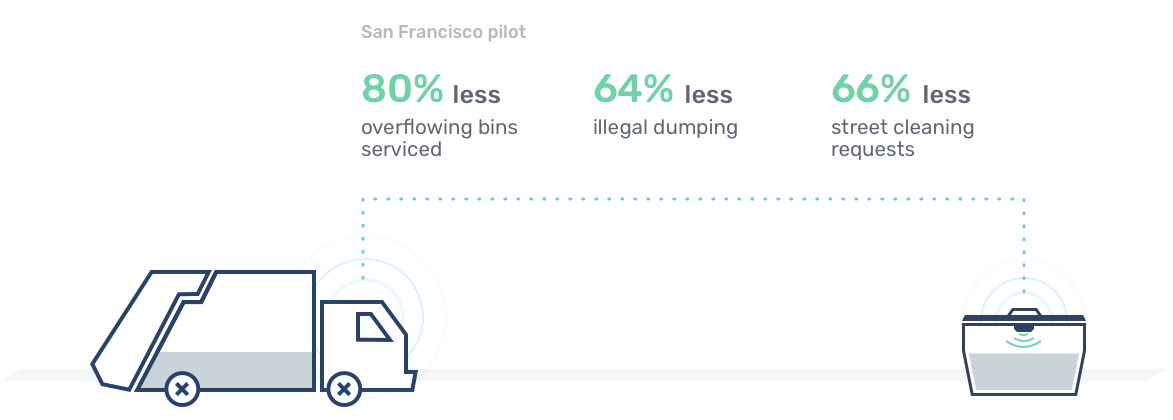When you think about trash bins or waste management, we´re guessing advanced technologies like artificial intelligence (AI), machine learning and Internet of Things (IoT) don’t come to mind. For the most part, waste collection is a decidedly low-tech undertaking, even in the world’s most dynamic urban centers. Garbage trucks crisscross cities and service trash bins on predetermined routes with predetermined schedules. Some bins are already overflowing when serviced; others are serviced well before they are full. And data shows nearly half are serviced when they are virtually empty.
We largely manage waste collection today the way we did 100 years ago. Sending CO2-emitting vehicles on rigid schedules and static routes to collect trash from lots of empty or half-full bins is, well, wasteful. While trucks service empty bins, quickly filling and overflowing bins remain neglected. The process is unnecessarily expensive and environmentally harmful, and it fails to address overflowing trash, which leads not only to dirty streets but pests, illegal dumping and a surge of complaints from the public.
But what if we applied some of the most advanced technologies currently available to disrupt the waste management industry? What if trash collection were actually data-driven? What if innovations like data analysis and machine learning could optimize collection routes and reduce the number of overflowing bins, the overall number of collections and the number of public complaints, ultimately contributing to a cleaner city?
Fortunately, this is something we can do today. It’s already happening in Copenhagen. And implementing the most advanced technology-enabled waste management is already saving that city at least an estimated €1 million per year.
This spring, that technology will be coming to San Francisco. A highly successful pilot project in 2018 involving 48 “smart” trash bins strategically placed throughout San Francisco virtually eliminated “overflow” complaints from the public. It also produced an 80% drop in the number of overflowing bins serviced, a 64% drop in illegal dumping and a 66% reduction in street cleaning.
This new citywide initiative will build on the pilot’s success on a much larger scale, encompassing 1,000 bins along many of the City’s most active commercial corridors and thereby increasing its potential twentyfold.
These measurable improvements to waste management are enabled by tiny, optical, Internet-connected sensors developed by Nordsense that can be discreetly installed in trash cans to help cities monitor bin activity – including fullness, temperature and fill rates. The sensors monitor 16 reference points within each individual container, continually gathering data and generating a “topology” of waste for individual containers. The sensors tell us when a bin is nearly full, detect protruding objects and static zones, and help filter out false positives that may signal more waste than is actually present.
The result? Ordinary trash bins are transformed into “smart” bins. Data from the sensors tells us where and when to service bins, when bins will likely need servicing again, and how to most efficiently route collection trucks on dynamic routes that change from day to day and hour to hour based on actual conditions on the city streets.
Drivers of collection vehicles use a mobile application to receive optimized routing with spoken directions and are notified of route changes during a trip. For instance, if a trash bin in the area suddenly becomes full, the bin can be added to the nearest vehicle’s route. As the body of sensor-collected data grows, the city will be able to make accurate predictions about waste generation patterns and respond rapidly to changing conditions in specific areas. As a result, the city will be cleaner, and the use of waste collection resources will be much more efficient.
Finally, waste management will be smart — not wasteful.
